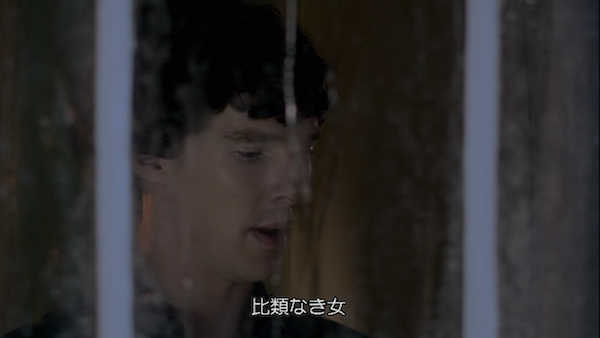
BBC Sherlock Fan Forum - Serving Sherlockians since February 2012.
- tobeornot221b
- One More Miracle
 Offline
Offline 
- From: Germany
- Registered: February 12, 2012
- Posts: 6,761
Re: Sherlock in other languages...
Oh - that's hilarious and partly quite absurd! ![]()
I've never seen the German subtitles.
Wonderful job, QE!![]()
---------------------------------------------------------------------------------------------------------------------------------------------
John: "Have you spoken to Mycroft, Molly, uh, anyone?"
Mrs Hudson: "They don’t matter. You do."
I BELIEVE IN SERIES 5!

- Schmiezi
- Reichenbach Survivor
 Offline
Offline 
- From: NRW, Germany
- Registered: August 10, 2012
- Posts: 5,478
Re: Sherlock in other languages...
The lovely difference betwen thinking it's "okay" that he does not wear any pants and thinking it's "good" that he does not wear any pants... ![]()
Last edited by Schmiezi (June 20, 2013 5:13 pm)
---------------------------------------------------------------------------------------------------------------------------------------------------------------------------------
I still believe that love conquers all!


"Quick, man, if you love me."
- sj4iy
- High Functioning Sociopath
 Offline
Offline 
- From: USA
- Registered: June 12, 2013
- Posts: 2,692
Re: Sherlock in other languages...
I love this screencap from the Japanese version. It's actually differnent than what is onscreen, because in Japanese, context means a lot. They don't have an equivalent to "the", so they referred to Irene Adler as "that woman" or "ano onna". At the end, when Sherlock says "The woman...the woman", he says it "Ano onna...ano...onna", but the subtitle is different:
It says "Hiruinaki onna", which means "The woman without parallel".
Last edited by sj4iy (June 20, 2013 6:03 pm)
__________________________________________________________________Bigby: Will you shut up?
Colin: Well, maybe if my throat wasn’t so parched, I wouldn’t have to keep talking.
Bigby: Wait, that doesn’t make se-
Coline: Just give me a drink, please.
- •
- QuiteExtraordinary
- Official Blogger
 Offline
Offline 
- From: not this planet
- Registered: September 18, 2012
- Posts: 1,803
Re: Sherlock in other languages...
sj4iy wrote:
It says "Hiruinaki onna", which means "The woman without parallel".
That's a beautiful phrase. ![]()
I'm currently watching HOUNDS. Not as funny as SCANDAL, but still fascinating.

Dubbing: "Sie tun immer so verdammt geheimnisvoll mit Ihren … Wangenknochen und schlagen den Kragen hoch, um cool auszusehen."
And the question of the day:
---------------------------------------------------------------------------------------------------
He’s got a dog. We go to the pub on weekends. I’ve met his mum and dad …

… and his friends and all his family and I’ve no idea why I’m telling you this.
- QuiteExtraordinary
- Official Blogger
 Offline
Offline 
- From: not this planet
- Registered: September 18, 2012
- Posts: 1,803
Re: Sherlock in other languages...
Reichenbach with informal addressing. Touching.












---------------------------------------------------------------------------------------------------
He’s got a dog. We go to the pub on weekends. I’ve met his mum and dad …

… and his friends and all his family and I’ve no idea why I’m telling you this.
- Mary Me
- High Functioning Sociopath
 Offline
Offline 
- From: Germany, Bonn
- Registered: January 8, 2013
- Posts: 3,250
Re: Sherlock in other languages...
![]()
~~~~~~~~~~~~~~~~~~~~~~~~~~~~~~~~~~~~~~~~~~
"Falling is just like flying, except there’s a more permanent destination."
"Sherlock Holmes is a great man, and I think one day—if we’re very very lucky—he might even be a good one."
"Would you like to-"
"-have dinner?"
"-solve crimes?"
"Oh"

- QuiteExtraordinary
- Official Blogger
 Offline
Offline 
- From: not this planet
- Registered: September 18, 2012
- Posts: 1,803
Re: Sherlock in other languages...
Well, after watching the whole series 2 with these subtitles I have to say, honestly, I cannot recommend doing that. As soon as the informal "Sie" is missing, the impression that Sherlock and John are a couple becomes so intense sometimes it's not even funny anymore. I felt confused.
---------------------------------------------------------------------------------------------------
He’s got a dog. We go to the pub on weekends. I’ve met his mum and dad …

… and his friends and all his family and I’ve no idea why I’m telling you this.
- Mary Me
- High Functioning Sociopath
 Offline
Offline 
- From: Germany, Bonn
- Registered: January 8, 2013
- Posts: 3,250
Re: Sherlock in other languages...
So you think the translators have intended to offer some kind of protection? ![]()
Though, after all I have to agree with you. It's really confusing sometimes. Especially "Ich bin ja nur dein Freund."
~~~~~~~~~~~~~~~~~~~~~~~~~~~~~~~~~~~~~~~~~~
"Falling is just like flying, except there’s a more permanent destination."
"Sherlock Holmes is a great man, and I think one day—if we’re very very lucky—he might even be a good one."
"Would you like to-"
"-have dinner?"
"-solve crimes?"
"Oh"

- QuiteExtraordinary
- Official Blogger
 Offline
Offline 
- From: not this planet
- Registered: September 18, 2012
- Posts: 1,803
Re: Sherlock in other languages...
The subtitles are strange. More accurate than the dubbing, but ... when two people are living together and say things to each other like, "Du machst nie Kaffee", without the distancing "Sie", and all the time ...
---------------------------------------------------------------------------------------------------
He’s got a dog. We go to the pub on weekends. I’ve met his mum and dad …

… and his friends and all his family and I’ve no idea why I’m telling you this.
- sj4iy
- High Functioning Sociopath
 Offline
Offline 
- From: USA
- Registered: June 12, 2013
- Posts: 2,692
Re: Sherlock in other languages...
Formality and informality seem to be as tricky in German as it is in Japanese. Who would have thought, lol?
Sherlock says "boku" (I) and "kimi" (you), and both are very neutral (for a man). So he's not putting himself above or below anyone (polite), but he is extremely rude to them. John does, too- but I actually had to go back and listen to it again. Pronouns are often dropped in Japanese as long as the speaker and listener know what is being said. For example, in that entire conversation with Sherlock in the lab before Sherlock goes to the roof, John says "kimi" (you) one time and "boku" (I) never. Sherlock says it a few times, but he's the one initiating the conversation.
Last edited by sj4iy (June 21, 2013 8:01 pm)
__________________________________________________________________Bigby: Will you shut up?
Colin: Well, maybe if my throat wasn’t so parched, I wouldn’t have to keep talking.
Bigby: Wait, that doesn’t make se-
Coline: Just give me a drink, please.
- •
- Kittyhawk
- Mycroft's Contact
 Offline
Offline - From: France
- Registered: April 5, 2015
- Posts: 451
Re: Sherlock in other languages...
Reviving this thread because I think the French translators did a pretty good job of the "amo/love" problem in The Six Thathers. I'm not aware of any French word that's abbreviated to "amo", whereas the French for "love" is "amour" which would have been to close.
So they changed Lady Smallwood's code name to "Venus" and put "Afro" on the screen as overheard code name (and of course in the dialogue, but at first I watched the English version) - "Afro like the hairstyle" (that is actually mentioned). When Sherlock makes the connection, he asks his brother whether he remembers his mythology lessons - Afro is short for Aphrodite, the Greek equivalent to the Roman Venus.
Pretty clever, I thought!
- Yitzock
- Stayin' Alive
 Offline
Offline 
- From: Canada
- Registered: May 5, 2015
- Posts: 3,882
Re: Sherlock in other languages...
Yes, that is! I had forgotten about that part, but it would pose a translation problem. Sounds like they came up with a good solution.


Clueing for looks.
- Kittyhawk
- Mycroft's Contact
 Offline
Offline - From: France
- Registered: April 5, 2015
- Posts: 451
Re: Sherlock in other languages...
In The Lying Detective they had another problem, which for my understanding of French wasn't quite as well solved: In the original Sherlock says he takes Faith's case because she said that her life turned on one word, whereas names always are two words. In French "anybody" is "n'importe qui", "somebody" would be "quelqu'un" - three and two words respectively.
The solution they've found is Sherlock pointing out that "a few words" (quelque mots) is not the the same thing as "last and first name" (nom et prénom) - and frankly, I'm not sure whether there is really a distinction made between "name" and "word"...
Unfortunately I'm missing lots of nuances in the dubbing, because I'm not a native speaker and find especially Sherlock (both the show and the man himself) very hard to understand. And French subtitles are so unreliable that I've not yet looked at them. Maybe I should...
Edited to add: I tried, and discovered that the French DVDs don't have subtitles for the hard-of-hearing (i. e. the dubbed version). So I'll never know what Moriarty said for "the big G" ![]() (what I understand - bastourdi or bas tour D - is not in the dictionary, though D for directeur would be logical)
(what I understand - bastourdi or bas tour D - is not in the dictionary, though D for directeur would be logical)
Last edited by Kittyhawk (October 12, 2017 11:23 am)

